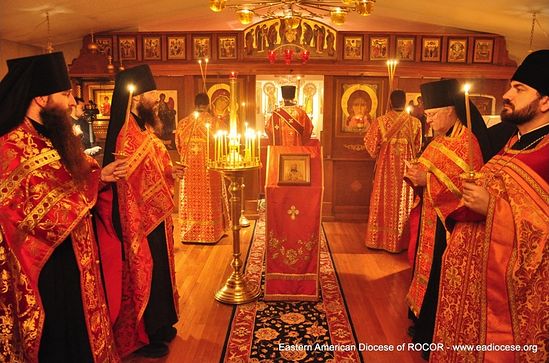O Hilarion, warrior of Christ, glory and boast of the
Church of Russia,
thou didst confess Christ before the perishing world, hast
made the Church steadfast by thy blood,
and having acquired divine understanding, hast proclaimed
unto the faithful:
Without the Church there is no salvation!"
- Troparion to St. Hilarion of Verey

The monks of Holy Cross Monastery share a special connection with St. Hilarion, many of whose writings have been translated into English and are extremely helpful for converts because they deal with issues that pertain to Catholics and Protestants.
"Many of the questions that we began to ask when we were looking for the historic Christian Church are addressed in St. Hilarion’s writings, for instance, the place of Holy Scripture in Christian history and Christian Tradition," said monastery dean Hieromonk Alexander (Frizzell).
"I recall having read ‘Holy Scripture in the Church’ by St. Hilarion, and in this wonderful essay he places the Bible in context as the possession, the property, of the Orthodox Church, not as something separate from the Church."
St. Hilarion is also dear to the monks of Holy Cross Monastery, because as one of the new hieromartyrs of Russia, he served Christ under circumstances that were far from normal. Before the revolution, many bishops such as St. Hilarion had all of the material things that they needed, thanks to the ruling Orthodox monarchy. A large cathedral, many parishioners, several staff members and government support were some of things that made life easier for Russian Orthodox bishops during the rule of the Tsar. The tribulations that overcame Russia after the Bolshevik Revolution removed all of these external supports for any bishop or clergymen, who now found himself living in a completely foreign world.
"Here at the monastery, we are often tempted to complain about conditions not being exactly what we want them to be," explains Fr. Alexander. "It’s very easy for us to think that, in order for us to be saved, in order for us to have a successful monastic or spiritual life, or Christian life in general, we need the right conditions to live in, the right church to pray in, the right financial stability, the right order to our lives and our prayer. However, oftentimes these conditions are not present, much like today when we as Orthodox Christians are a minority in America. We have to make a choice just like St. Hilarion – will we stay faithful to Christ, or will we make excuses for ourselves and in doing so neglect to carry the cross that He has provided us for the sake of our eternal salvation?"

"Finding themselves in the difficult conditions of prison camps, jails, interrogations, transport to faraway sites in the Russian North, St. Hilarion and others like him didn’t complain about this new and difficult way of life that God had allowed for them," said Bishop George (Abbot of Holy Cross Monastery and Vicar of the Eastern American Diocese). "They interpreted all of the new conditions under which they lived as Providential opportunities for the salvation of their souls. St. Hilarion very quickly adapted to life in the camp and began to see these difficult conditions as a school of virtues where, by being surrounded by all types of people, some of whom were known to be hardened criminals, he began to live out the Gospel commandments in a completely pure and inspired way."
For this reason, the monks at Holy Cross Monastery commissioned an English translation of the Slavonic service to St. Hilarion, which they received from their brother monks at Sretensky monastery in Moscow. Three days before the feast day, Reader Isaac Lambertsen, a well-known translator in the Russian Church Abroad, translated the entire service into English, thus giving the monks the opportunity to glorify St. Hilarion in English, for the first time in history. The service was conducted before an icon of St. Hilarion containing a piece of his relics, which was given to Bishop George in 2004 by the Abbot of Sretensky Monastery, Archimandrite Tikhon (Shevkunov).
"It was a tremendous honor for us to fulfill this small labor of love in honor of the new hieromartyr Hilarion," said Fr. Alexander. "Looking at his life, we’re encouraged not to complain about our sometimes difficult external conditions. His life and struggles are proof to us that no external conditions can prevent us from fulfilling the Gospel commandments and working out the salvation of our souls, if we will only give ourselves over completely to the will of God and give our hearts in the most sincere way to our Savior, no matter what His will may be for us or what He will allow for us externally."
Eastern American and New York Diocese of the Russian Church Abroad
